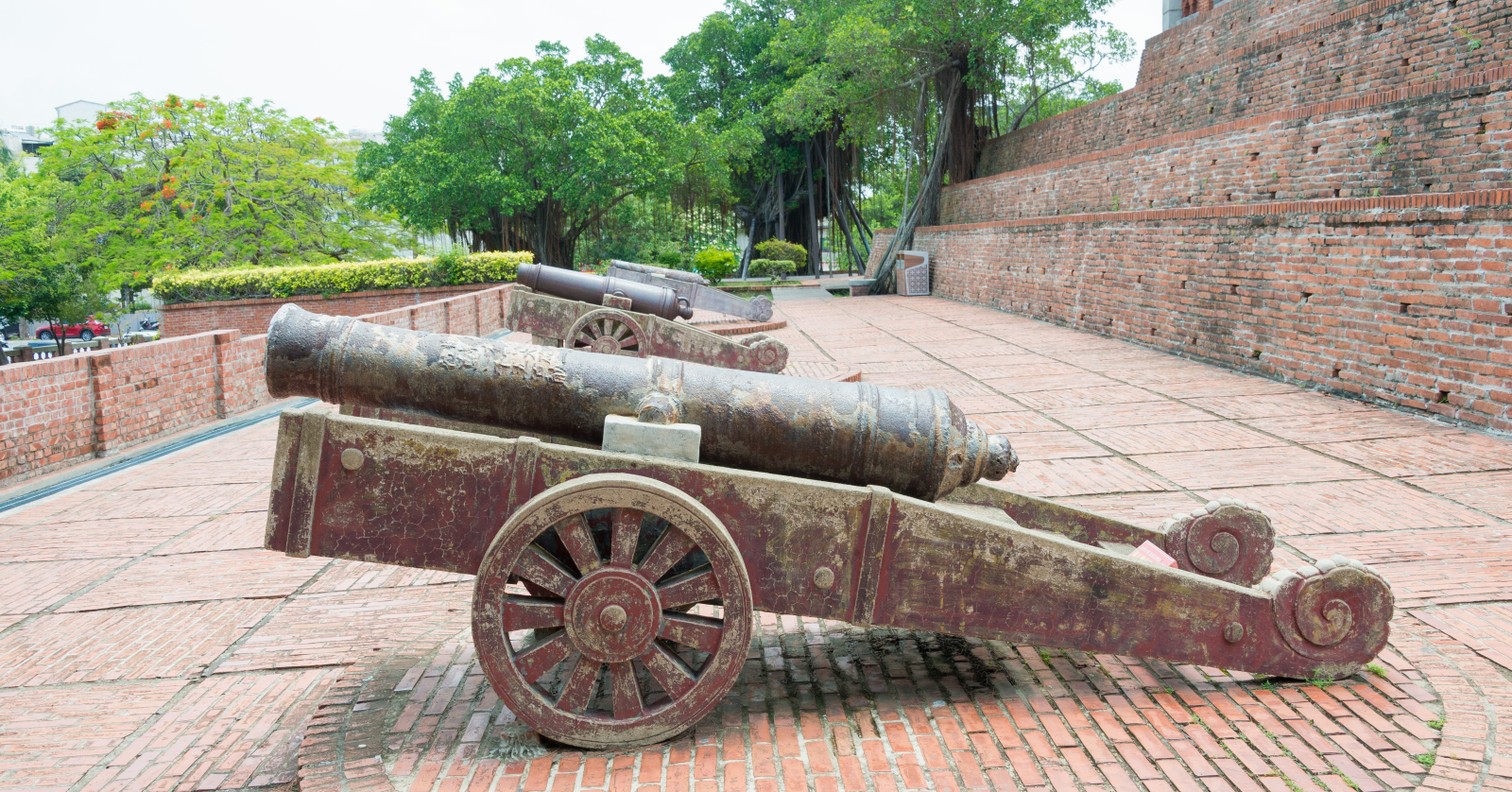
Forbidden Love At The Sunset of Fort Zeelandia – The Legend
Forbidden Love – Escape from Shanghai – Cheng-han had always felt like a stranger in his own city. Tall, quiet, and prone to long silences, he drifted through the dense Shanghai streets with his head filled with stories. He dreamed not of riches or business, but of discovery—of finding a place that felt like his. His father, Chun-hung, thought it was childish nonsense.
“You live in your head, boy,” he would mutter while smoking his pipe, shaking his head at Cheng-han’s talk of far-off lands, foreign cities, and wild romance.
But Cheng-han had done it. He’d left.
He crossed the South China Sea and stepped foot onto Taiwan—still wild, barely settled, and brimming with the unfamiliar. The air smelled of salt and sun. The rhythm of life was slower here, looser. No more smoky streets or shouted trades. Just heat, sweat, and possibility.
Starting Over
Work came quickly. Fort Zeelandia, the new Dutch stronghold on the island’s coast, needed hands. Cheng-han became one of them—unskilled, anonymous, and sore by the end of every day. Still, he was grateful.
The fort was unlike anything he’d ever seen. Three tall rings of reddish Dutch brick stood out against the palm trees and muddy ground. Each corner had a bastion, cannons pointed out to sea. Soldiers marched in tight rows. Church bells rang like clockwork. And inside, everything smelled like iron and oil.
Most locals didn’t get this close. Civilians stayed outside the walls. But Cheng-han passed through daily, hauling bricks or fetching tools, working himself into the rhythm of the foreign fortress.
First Sight of the Dutch
The Dutch, with their pale faces and heavy boots, rarely spoke. Most were curt and cold. Their words were clipped. Their eyes never lingered. Cheng-han had seen them yell at the other workers, toss silver carelessly, and walk past locals without acknowledgment. He knew better than to speak unless spoken to.
But somehow, he stood out.
Earning Trust
Hendrik Gerritt, a gruff Dutch officer with sun-darkened skin and a belly like a barrel, took notice. He shouted orders in broken Mandarin, barking at workers without looking up. But when Cheng-han responded clearly, quickly, and without complaint, Hendrik raised his head.
“Good,” he said once. “Smart boy.”
From then on, errands started coming. First a single message. Then a daily task—notes, letters, deliveries. Hendrik’s tone remained sharp, but the requests became steady. And with each completed task, Cheng-han’s presence in the fort changed. No longer just another laborer, he was becoming trusted. Known.
He didn’t smile about it, not openly. But every morning, when he crossed the marketplace and slipped past the guards, a quiet pride built in his chest.
Something was beginning.
The Angel in White
It was January 1634. Fort Zeelandia was almost finished. Cheng-han was rushing through the inner yard, a sealed letter gripped tight in his hand, sunlight blinding him at every corner. He rounded the corner too fast, collided with a stack of trunks, and fell hard.
When he looked up, he thought he might be dead.
She stood above him—golden hair shimmering in the sun, a soft white dress falling over her like silk. She wasn’t a soldier’s wife or a local servant. She looked untouched by the heat, the dust, the sweat of this place.
She looked like something out of a dream.
Unreal and Then Too Real
For two days, he searched.
He lingered in hallways, peeked through doorways, wandered the corridors outside the officer’s quarters. But she didn’t appear. His heart felt foolish. Had he imagined her?
Then, while delivering a supply order, he overheard two guards speaking in Dutch. Her name was Adriana.
Gerritt’s daughter.
It hit him like a slap. The beautiful girl in white—his angel—was the child of the very man who gave him orders each day. What cruel trick of fate had put them on the same path?
A Second Chance
He didn’t expect to see her again. Yet, one day, while tending the garden outside the fort’s chapel, he looked up—and there she was.
Alone. Wandering.
She held a white parasol, her hair tied loosely, her gaze curious. She was walking slowly, pausing to admire a flower or peer at a beetle on a leaf. She looked like she didn’t belong to any part of this world.
Then her eyes found his.
She stopped.
And smiled.
Cheng-han froze. His hands were still in the dirt, the sunlight catching the sweat on his brow. He was covered in grime, kneeling like a servant, but her smile didn’t change.
She walked closer.
He forgot to breathe.
Her blue eyes—closer now—were clear, watchful, and kind. Then, just as gently as she came, she passed him, her parasol tilting slightly in acknowledgment.
A Garden of Secrets
After that, Cheng-han returned to the garden as often as he could.
He volunteered for maintenance, always offering to trim hedges or weed the flower beds. He never asked where she stayed or when she’d appear. He simply waited, hoping.
Sometimes she walked with her maid. Sometimes she was alone. And sometimes, when their eyes met, she smiled again.
They never spoke.
They didn’t need to.
Hope in Silence
He started dreaming of her.
Of conversations they hadn’t had, of soft words exchanged under trees. He imagined brushing her fingers with his. He imagined her voice. He imagined things that could never be spoken.
She had become the centerpiece of his days.
The scent of the garden reminded him of her. The breeze through the branches whispered her name. And in those silent moments, between shovels of dirt or sips of water, he imagined she might be thinking of him too.
Forbidden Love
He knew the rules. A Dutch girl—especially an officer’s daughter—would never be allowed near someone like him. He wasn’t even a proper citizen. Just another laborer in a world run by men with muskets and titles.
But none of that mattered when she smiled.
And so, each day, he returned to the garden. Not for work. Not for coin.
But for her.
When She Reached for Me
It was nearing dusk when it happened.
She extended her hand toward me. I didn’t understand the words she spoke—Dutch, soft and musical—but I didn’t need to. Her gesture was enough. That one moment—her glove brushing against my dirt-stained fingers—felt like the whole world had stilled.
I hesitated.
Then I took her hand.
Her skin was warm through the cloth. Something surged inside me—new and wild and terrifying. I felt dizzy. My feet moved before I gave them permission, following her toward the stairs of the fort.
Atop the World
The high tower at Fort Zeelandia overlooked the coast. Ships bobbed like toys in the harbor, sails furled, lanterns starting to glow as the sun dropped behind the horizon. The sky looked as if it had been set on fire—orange, red, purple bleeding together like ink in water.
She stood near the edge, her silhouette haloed in gold. I couldn’t breathe.
She turned and smiled.
I reached out and touched her cheek. Soft. Too soft for hands like mine.
I withdrew.
Ashamed.
I looked at my fingers—calloused, dark with soil—and wished I’d worn gloves. She, in her ivory dress, looked like something carved from porcelain. I felt like a stain on a clean page.
But then—her hand pressed gently against my chest.
Her eyes searched mine, trembling but sure. I placed my hand over hers. She didn’t pull away.
Two Souls in Silence
The sun vanished behind the ocean. The wind picked up, curling around us like a whisper. We stood still. Not speaking. Not needing to.
I stepped closer.
She didn’t move.
I put my arms around her. She pressed her face into my shoulder. Her hair smelled like lavender. My chest rose and fell too fast.
She tilted her head back, and I kissed her.
It was soft. Then deeper. Then desperate.
Our bodies pressed together. I held her tighter, afraid the moment would vanish like smoke. Her gloved fingers slipped into my hair. I heard her whisper something—sweet, breathless Dutch I didn’t know—but I knew what it meant.
She didn’t need to say it in Mandarin.
More Than Flesh
We met again the next day. Then again. Always on the tower, always just after sunset, always with the same thrill and the same fear.
Sometimes she came breathless, her maid trailing behind before peeling off in another direction. Sometimes she came alone, clutching a book she didn’t read.
We didn’t dare do more than kiss.
But our kisses deepened. Our hands lingered. Her fingers explored the line of my jaw, the buttons of my shirt. My hands held the small of her back. I wanted her in a way I hadn’t thought possible. But I couldn’t ask for what I truly wanted.
Not yet.
I couldn’t take anything from her. Not without giving her everything first.
Waiting for the Impossible
In daylight, I labored. At night, I lived.
I watched her from a distance when she strolled with her father or sat in the officer’s garden. I never approached. But sometimes, she glanced back at me. Just once. That was enough.
I started dreaming of a cottage by the sea, far from Fort Zeelandia. Her hands in mine. A life where I wasn’t afraid. Where she wasn’t watched. A life where we could wake and sleep without lies.
But I knew what I was to the Dutch.
And I knew what she was to them.
Still, I returned to the tower each night, and she came. Always late. Always smiling.
We didn’t speak of escape. We didn’t dare.
But every time we touched, I felt like we already had.
Adriana’s Secret
Adriana lived in constant fear. One wrong glance, one whispered report, and Cheng-han would be gone—jailed, beaten, or worse. She often woke in sweat, her stomach tight, afraid their secret had already been exposed. Yet her heart didn’t care. She was pulled to him like breath to lungs. And no matter how many times she told herself it had to end, her legs still carried her to the fort’s upper walls at sunset.
She hadn’t come to Fort Zeelandia for love. She came to endure her father’s discipline. The place had felt dead the day she arrived—gray, wind-battered, reeking of salt, tobacco, and horse. The gates had loomed over her—tall Dutch stone arched with iron spikes and flanked by men in thick wool uniforms. Inside, it was all mud paths, shouting men, and the constant hammer of boots on brick.
She hadn’t expected anything to stir in her.
But then Cheng-han knocked over her trunks.
And everything changed.
What Love Feels Like
He was shy. Soft-spoken. He blushed when she looked at him. But his hands were strong. And his eyes were honest in a way she’d never seen before. He didn’t treat her like property. He didn’t try to charm her with empty words. He just stood there. Steady. Present. Real.
She’d grown up hearing words like unclean, uncultured, and beneath us. But those words crumbled every time Cheng-han touched her arm or tucked a flower behind her ear. When he looked at her, she saw something better than Holland, better than duty—she saw possibility.
A Sudden Parting
Then it stopped.
He never showed up that evening.
Or the next morning.
The garden felt colder without him—its thick banana leaves hanging like wet sheets, and the carved stone bench where they’d once kissed now empty and slick with dew. She asked a servant, trembling.
“He’s been sent to Armosa,” they said. “Two days. Maybe three.”
She barely heard the words. A new message came from her father—she was to leave at dawn. The ship was already being loaded.
No warning. No way to tell him.
She didn’t sleep. Just packed in silence. Then, when no one was looking, she returned to their tower and waited. She watched the sky shift from charcoal to blue. Watched the city come alive with barking dogs and hissing pots and the creak of cart wheels. But Cheng-han never came.
The Final Goodbye
At the port, the ship loomed large—an East Indiaman, its masts slicing the overcast sky, its sails stiff in the wind. The salt air stung her lips. The docks smelled of tar, fish, and something sour and metallic she couldn’t name. The ocean groaned behind her, waves slapping the hull in steady rhythm.
Her hands gripped the wooden rail as the men shouted, casting off lines. Her throat burned.
Then—
Her name.
Low at first. Then louder.
“Adriana!”
She turned.
He was running down the stone steps of the fort, barefoot, coatless, arms out, shoving past workers and guards. His eyes locked on hers. She called to him through sobs, but the ship had already pulled from the pier. Five metres. Then ten.
He didn’t stop.
He leapt.
The splash echoed louder than the cannons ever had.
She saw his arms flailing, his head rise once, mouth open, eyes wild. Then nothing. Dock workers dove in, shouting. She lost sight of him beneath the churning water. The ship kept drifting. The voices faded.
And Cheng-han was gone.
Ghost of the Fort
They told her later that he had drowned. That the currents beneath the dock were strong, dragging men down into rock and weed. No body was ever found.
Adriana never spoke his name aloud again. She returned to Holland. Married Hans. Had two daughters. But never loved again.
Years passed. And still, the stories spread.
Visitors to Fort Zeelandia often report seeing a boy at sunset—tall, soaked, barefoot, standing silently near the upper wall where the lovers used to meet. He looks out to sea. Never speaks. Never turns.
Some say, if the air is still and the light hits just right, you’ll see a girl too. Blonde. Pale. In a long white dress. She stands near the gate, behind the tall stone arch, as if waiting for something. Or someone.
They never touch.
They only wait.
And when the wind rushes through the tower stairs, it carries whispers no one can translate.
But those who have known heartbreak swear they hear them.
Still calling each other’s name.



